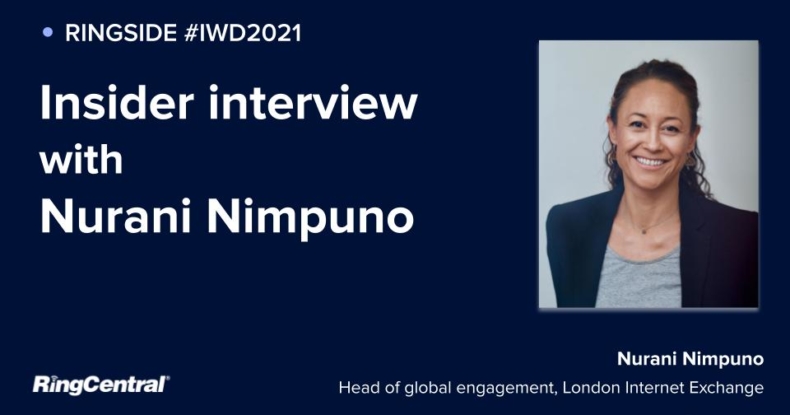As part of our support for International Women’s Day “Choose to Challenge”, we invited women in leadership to discuss their views on gender inequality and related issues. Besides hearing from some of our own female leaders, we also reached out to inspiring women from other businesses. For this #IWD2021 Ringside, we caught up with Nurani Nimpuno, Head of Global Engagement at the London Internet Exchange (LINX), one of the largest Internet exchange points in the world. At LINX, Nurani oversees Global Strategy and Global Partnerships.
Nurani has been supporting the Internet for a number of years. She is the former CCO at Asteroid International, building IXPs and managed IXP solutions around the world, and was prior to that the Head of Outreach and Communications at Netnod in Sweden.
Nurani is actively involved with Internet policy, governance and infrastructures issues globally. She serves on the Euro-IX board, the European Association for IXPs, as well as the ICANN ASO Advisory Council. She is also the chair of the IANA Numbering Services Review Committee.
For her work in the IANA Stewardship Transition, Nurani Nimpuno received the prestigious ICANN Leadership award in October 2015.
Nurani, what’s been the driving force to get you where you are today, and have you benefited from having any personal mentors?
Curiosity, the desire to learn and an unhealthy fear of failure.
I have always been driven by the desire to learn new things, broaden my horizons and to understand the world around me. As I have worked in the tech industry for most of my career, and since my roles always involved communications in some form, I always wanted to understand the technical aspects of what I was communicating. I have never been particularly interested in climbing a career ladder, but I have always been driven to learn and develop. And since I’ve never wanted to stand in front of an audience looking like I didn’t know what I was talking about, I’ve often been ridiculously over-prepared. But I guess a positive side effect of that is that I’ve forced myself to learn a lot of things!
I have not had a mentor, but I have certainly learnt a bucketload from others in the industry. I’ve been blessed to have a lot of competent people around me and I have always made an effort to learn from them.
What advice would you pass on to other women to help them progress and overcome issues associated with ‘the glass ceiling’ in your industry?
My most concrete piece of advice is to build yourself a network of people around you. And make sure to have a tight group within that network that will support you, mentor you, advise you, and give you honest feedback. Do the same for them. Support them, nominate them for positions, encourage them to step forward. Many women are reluctant to put their name forward for positions, but will step forward if encouraged or nominated by someone else. Most of the committees I have been on have been the result of someone else nominating me. And once I was on that committee, I realised very quickly that I was more than up for the job. Since people put their trust in me, I decided very early on to do the same for others. If I believe someone is up for the job, I will encourage them, support them, or nominate them for positions I think they could do a good job in, particularly if it’s a woman, a young person, or a person with a different background.
I am a strong believer in human networks and throughout the years I’ve built networks with people from all over the world. I believe in being generous with helping others and simply doing the right thing, as I actually think your life will be better for it. And I have been surprised by how often someone from my past has opened a door for me, done me a favour or agreed to a deal because of something I did for them 15 years ago, or due to their trust in me because of our longstanding relationship.
Are there any initiatives from inside or outside your organisation that you think make a substantive difference in addressing the gender pay gap and open up opportunities for females to progress in their careers?
I think there’s an undeniably strong case for diversity in organisations. Diverse groups are smarter than homogenous groups. People often talk about diversity as a token thing, but to me it’s clear that you cannot run an organisation effectively, or sell services and products to a diverse set of customers, if your organisation only represents a small set of perspectives.
There is a lot of research that shows that when organisations, boards, committees are made to think about diversity, it forces them to go outside of their bubble. Not only does it enrich that group, but the recruitment becomes more thorough and of a higher standard, because people are simply forced to be less lazy. It is so easy for all of us (me included) to just look within our own little bubble, or look for people who are like us, and not consider that a broader set of candidates introduce new, valuable perspectives. The gender balance work should be part of that diversity work of course. We are half of the population, after all!
Whether you’re a man or a woman, commit to doing your part in increasing diversity and improving the gender balance in your organisation, community, and professional network. Nurani Nimpuno, LINX Click To Tweet
Why do you think we still have so few female leaders (vs. male as a percentage of total leadership) across so many sectors?
I think there’s a broad range of reasons of course. Societal, cultural, structural, and personal. It starts with how we raise girls, what education we encourage them to choose, what role models they find and how organisations recruit.
Research shows that men often apply for a position if they meet two thirds of the requirements in a job ad, while women only apply if they feel they meet 100% of the requirements. I also think women are less likely to put their name forward for promotions, volunteer positions etc, if they are not sure they can do it or that they have the support within the organisation. So finding better ways of actively recruiting, looking for a broad set of candidates, and not just waiting for people to apply, is key.
There’s no magic bullet but you can start small and grow. Representation matters. Organisations with a higher representation of women in the leadership will attract more women, and will also encourage more women to seek out the leadership positions. Change generates change.
Do you have any final thoughts you’d like to share on International Women’s Day and the topics we’ve discussed today?
Equality is not just women’s rights, it something that everyone benefits from. You can’t fix inequality on your own, but we can all do something. You can put your name forward and be a role model for others. You can pave a path for others behind you, and you can support other women to step up. Whether you’re a man or a woman, commit to doing your part in increasing diversity and improving the gender balance in your organisation, community, and professional network.
Organisations with a higher representation of women in the leadership will attract more women, and will also encourage more women to seek out the leadership positions. Nurani Nimpuno, LINX Click To Tweet
Many hands make light work, and small habits build up to big differences. We’re looking forward to seeing the benefits of building diversity and inclusion in UK businesses and beyond. Thank you to Nurani for sharing her insights with us.
We are revelling in International Women’s Day! More #IWD2021 Ringside interviews are on their way.
Originally published Mar 16, 2021

